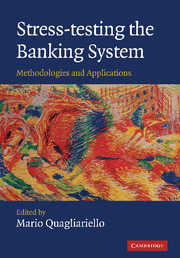Book contents
- Frontmatter
- Contents
- List of figures
- List of tables
- List of boxes
- List of contributors
- Foreword
- Acknowledgements
- Introduction
- Part I Fundamentals
- Part II Applications
- 8 Stress-testing credit risk: the Italian experience
- 9 Stress-testing US banks using economic-value-of-equity (EVE) models
- 10 A framework for integrating different risks: the interaction between credit and interest rate risk
- 11 Stress-testing linkages between banks in the Netherlands
- 12 An integrated approach to stress-testing: the Austrian Systemic Risk Monitor (SRM)
- 13 From macro to micro: the French experience on credit risk stress-testing
- 14 Stress-testing in the EU new member states
- 15 Cross-border macro stress-testing: progress and future challenges for the EU
- 16 Stress-testing at the IMF
- Conclusions
- Index
- References
16 - Stress-testing at the IMF
from Part II - Applications
Published online by Cambridge University Press: 18 December 2009
- Frontmatter
- Contents
- List of figures
- List of tables
- List of boxes
- List of contributors
- Foreword
- Acknowledgements
- Introduction
- Part I Fundamentals
- Part II Applications
- 8 Stress-testing credit risk: the Italian experience
- 9 Stress-testing US banks using economic-value-of-equity (EVE) models
- 10 A framework for integrating different risks: the interaction between credit and interest rate risk
- 11 Stress-testing linkages between banks in the Netherlands
- 12 An integrated approach to stress-testing: the Austrian Systemic Risk Monitor (SRM)
- 13 From macro to micro: the French experience on credit risk stress-testing
- 14 Stress-testing in the EU new member states
- 15 Cross-border macro stress-testing: progress and future challenges for the EU
- 16 Stress-testing at the IMF
- Conclusions
- Index
- References
Summary
Introduction
For almost a decade, the IMF has been using stress tests to identify vulnerabilities across institutions that could undermine the stability of a country's financial system. Stress tests are typically performed as part of the Financial Sector Assessment Program (FSAP) – a joint effort by the IMF and the World Bank. Since the program's inception in 1999, the FSAP has become an essential element of the Fund's engagement on financial issues with its member countries. FSAPs have been or are being carried out for over 120 countries – two-thirds of Fund membership. FSAP re-assessments (that is, updates of the original, first assessment) are also taking place, with more than forty FSAP updates completed or underway. Some form of stress-testing has been universal in these assessments, ranging from very simple to more sophisticated exercises with associated macromodelling.
Reflecting the growing integration of financial sector work into Fund surveillance, Article IV teams have also started experimenting with stress-testing as part of regular consultations. It is very early days yet, and such exercises will probably be done on only a sub-set of countries and in a more limited fashion than what could be undertaken in an FSAP, given the broader scope of Article IV surveillance. But the direction of movement over time seems clear. It is in turn facilitated by the rapid expansion of interest in, and capacity for, macro stress-testing among the authorities in an increasingly wide range of countries.
Information
- Type
- Chapter
- Information
- Stress-testing the Banking SystemMethodologies and Applications, pp. 297 - 317Publisher: Cambridge University PressPrint publication year: 2009
References
Accessibility standard: Unknown
Why this information is here
This section outlines the accessibility features of this content - including support for screen readers, full keyboard navigation and high-contrast display options. This may not be relevant for you.Accessibility Information
- 1
- Cited by
